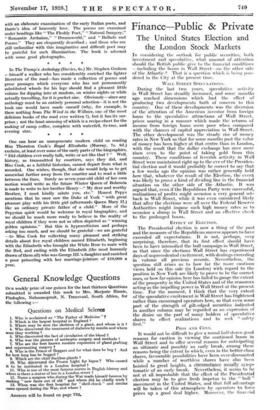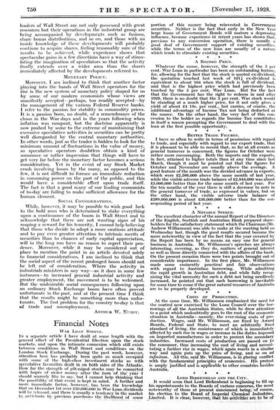Finance—Public & Private
The United States Election and the London Stock Markets IN considering the outlook for public securities, both investment and speculative, what amount of attention should the British public give to the financial conditions --including the boom in Wall Street—on the other side of the Atlantic ? That is a. question which is being pon- dered in the City at the present time.
WALL STREET SPECULATIONS.
During the last two years, speculative activity in Wall Street has steadily increased, and some months ago reached dimensions which had the effect of producing two developments both of concern to this country. One of these developments was the diversion of the attention. of the American investor from foreign loans to the speculative attractions of Wall Street, prices soaring in a manner which made the returns of income from foreign loans seem poor when compared with the chances of capital appreciation in Wall Street. The other development was the steady rise of money rates in New York so that for sonic months past the value of money has been higher at that centre than in London, with the result that the dollar exchange has once more risen even to the point of taking gold from this country. These conditions of feverish activity in Wall Street were maintained right up to the eve of the Presiden- tial election and it would probably be correct to say that a few weeks ago the opinion was rather generally held here that, whatever the result of the Election, the event was likely to prove a kind of dividing line in the financial situation on the other side of the Atlantic. It was argued that, even if the Republican Party were successful, realizations of profits might occasion a very general set- back in Wall Street, while it was even considered likely that after the elections were all over the Federal Reserve Authorities might impose such high money rates as to occasion a slump in Wall Street and an effective check to the prolonged boom.
EFFECT OF ELECTION.
The Presidential election is now a thing of the past and the measure of the Republican success appears to have exceeded all expectations. It is not, perhaps, very surprising, therefore, that its first effect should have been to have intensified the bull campaign in Wall Street, so that since the elections Wall Street has experienced days of unprecedented excitement, with dealings exceeding in volume all previous records. Nevertheless, the question still arises as to how far the more cautious views held on this side (in London) with regard to the position in New York are likely to prove to be the correct ones, or how far opinion here has failed to gauge the extent of the prosperity in the United States and of the resources acting as the impelling power in Wall Street at the present time. For the moment, I think that the very extent of the speculative excitement in Wall Street has frightened rather than encouraged operators here, so that even some part of the strength of gift-edged securities indicated in another column may be regarded as an expression of the desire on the part of many holders of speculative shares to effect realizations and to seek " safety first."
PROS AND CONS.
It would not be difficult to give a round half-dozen good reasons for caution in viewing the continued boom in Wall Street and to offer several reasons for anticipating an ultimate and possibly an early break, among these reasons being the extent to which, even in the better-class shares, favourable possibilities have been over-discounted while a 'number of worthless shares have also been hoisted to great heights, a circumstance usually symp- tomatic of an early break. Nevertheless, it seems to be not at all improbable that the effect of the Presidential election may be to give fresh impetus to the " bull " movement in the United States, and that full advantage will be taken of this atmosphere by operators to force prices up a good deal higher. Moreover, the financial leaders of Wall Street are, not only ,possessed with great resources but their operations in the industrial group are being accompanied by developments such as fusions, share bonus distributions, and so on, and those with an inside knowledge of these developments will probably continue to acquire shares, feeling reasonably sure of the results to be achieved, while experience shows that spectacular gains in a few directions have a way of stimu- lating the imagination of speculators so that the activity finally extends over a wider area than the shares immediately affected by the developments referred to.
MONETARY POLICY.
Moreover, I am inclined to think that another factor playing into the hands of Wall Street operators for the rise is the new system of monetary policy shaped for us by some of our modern economists whose views are manifestly accepted—perhaps, too readily accepted—by the management of the various Federal Reserve banks. I refer to the passion for stability in commodity prices. It is a passion born, no doubt, of a remembrance of the chaos in the War days and in the years following when inflation was rampant, but the doctrine apparently is now pushed by some to the extreme of maintaining that excessive speculative activities in securities can be pretty well disregarded by the central monetary authorities. In other words, just as the trader is bidden to look for the minimum amount of fluctuations in the value of money, so speculative operators doubtless obtain a kind of assurance or rather impression that things will have to get very far before the monetary factor becomes a serious consideration. Yet in the event of any Stock Market crash involving losses by the many, as opposed to the few, it is not difficult to foresee an immediate reduction in consuming power on the part of the public, and this would have a considerable effect upon trade itself. The fact is that a good many of our leading economists of to-day are failing to make sufficient allowance for the human element.
SOCIAL CONSIDERATIONS.
While, however, it may be possible to wish good luck to the bold man who is determined to stake everything upon a continuance of the boom in Wall Street and to acknowledge that there are not wanting signs of his reaping a reward for his temerity, I cannot help believing that those who decide to adopt a more cautious attitude and to pay even greater attention to intrinsic merits of securities than to chances of early capital appreciation, will in the long run have no reason to regret their pru- dence. Moreover, while it may be considered out of place to mention the point in an article devoted Solely to financial considerations, I am inclined to think that the social aspect of the recent prolonged boom should not be left out of consideration. Where the activity in industrials ministers in any way—as it does in some few instances—to increased general industrial activity and greater employment, the movement is to be welcomed. But the undesirable social consequences following upon an ordinary Stock Exchange boom have often proved unfortunate in the past, and at the present time I think that the results might be something more than unfor- tunate. The first problem for the country to-day is that of trade and unemployment.
ARTHUR W. KIDDY.







































 Previous page
Previous page